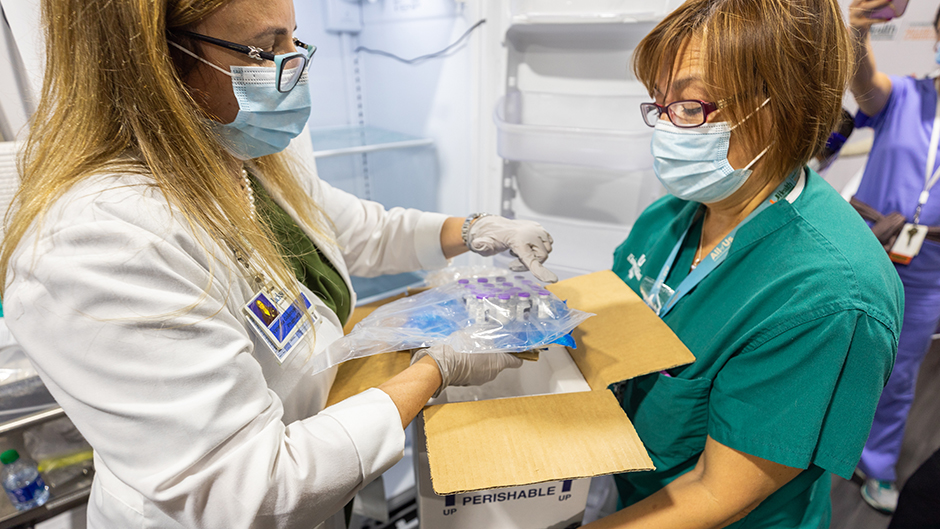Nearly one month ago, the University of Miami Health System received the first doses of the COVID-19 vaccine. As of Jan. 14, 2021, UHealth has vaccinated approximately 12,000 front-line health care workers, employees, and patients ages 65 and older, adhering to guidelines defined by the state.
Dr. Roy E. Weiss, the university’s chief medical officer for COVID-19, discusses the vaccine distribution. He helps to clarify how and when the University receives vaccines and what members of the University of Miami community should expect in the coming months.
Who provides the University with vaccines, and who determines how many we receive?
The Centers for Disease Control and Prevention (CDC) determines the national distribution of vaccines, and we currently receive the vaccines from the state. There is not a clear line of sight into how many we receive and when we receive them. As soon as we receive a shipment of vaccines, we are ready to deploy our teams to distribute the vaccine following state and federal guidelines. We currently have two vaccination sites and can vaccinate 1,000 people a day if supply is available. We have both the Pfizer and Moderna vaccines available, but that can change at any time.
How does the University determine who receives the vaccines?
We started with employees who care for or work in an area with COVID-19 patients. Per the Governor’s Executive Order on December 23rd, we began to vaccinate people ages 65 and older. At that time, we offered the vaccine to anyone on the Medical, Coral Gables, and Marine campuses (including satellites) who met the criteria. But we also started to vaccinate based on CDC-approved risk criteria. Our distribution plan also follows the ethical principles put forth by the American Academy of Medicine, CDC, and the Advisory Committee on Immunization Practices.
I opted-in to receive the vaccine but have not received any additional information. What happens next?
We have asked employees to opt-in to receive the vaccine and are working on a process for students to opt-in as well. We are following state and federal guidelines and using a phased approach for distribution, based on vaccine supply. When your phase is activated, you will receive an email communication from your MyUHealthChart account to schedule your vaccine appointment. All employees were given a UChart account at the beginning of the pandemic unless they opted out. This will take time as the amount of vaccine we have, the timing for receiving additional supplies, and the change that sometimes occurs in guidelines makes it difficult to establish clear timelines for activation of each phase. Our goal is to provide a vaccine to everyone at UM who wants one over time. You do not need to contact anyone as the order is placed at the time you electronically schedule your appointment.
What can I expect if/when I schedule an appointment for the COVID-19 vaccine at UHealth?
Once your phase is activated and you are eligible for the vaccine, you will receive an email from MyUHealthChart asking you to schedule. Once you schedule, you will be provided with the time and location of your appointment. You will need to bring your CaneID, valid Florida Driver’s License, and smartphone.
Once checked in, you will receive the vaccine and then be monitored for 15 minutes. While you are being monitored, you will schedule your second dose appointment and register for V-safe. A CDC smartphone-based tool, V-safe will record how you are feeling after receiving the vaccine.
Why can’t the University provide a definitive timeline for when the vaccine will be available in each phase?
We cannot provide a definitive timeline because we receive the vaccine supply from the state and do not have information on how many vaccines we will receive and when we will receive them. We also must follow the guidelines provided to us and they change. For example, we were vaccinating our front-line teams and moving through our phased approach when the governor issued the order that we needed to vaccinate those 65 and older. We then needed to shift vaccine supply to that population to comply with the order.
Is the vaccine safe?
Yes. The Food and Drug Administration has granted the vaccine Emergency Use Authorization, which means that it has been evaluated and shown to be safe and effective. To gain approval, any vaccine must have been tested in large clinical trials, scientifically showing that it is indeed safe and efficacious against the coronavirus. In the clinical trials, any side effects recorded were generally mild, occurred in a small number of people, and usually resolved in a few days. If you have any questions about whether you should take the vaccine, please contact your health care provider.
Why is vaccination better than building herd immunity?
Due to the large number of asymptomatic individuals who transmit the COVID-19 virus, a community is unlikely to develop “herd immunity”—which is when the majority of the population is immune to the virus and makes the possibility of spreading it unlikely. While herd immunity can occur through natural infection, the number of individuals that would need to have had the virus would be more than 70 percent—not likely something that can or will be achieved soon with COVID-19. However, vaccination can rapidly induce immunity in large populations making it unlikely that the virus can spread and cause disease.
Visit coronavirus.miami.edu for more information and FAQs to view frequently asked questions.

